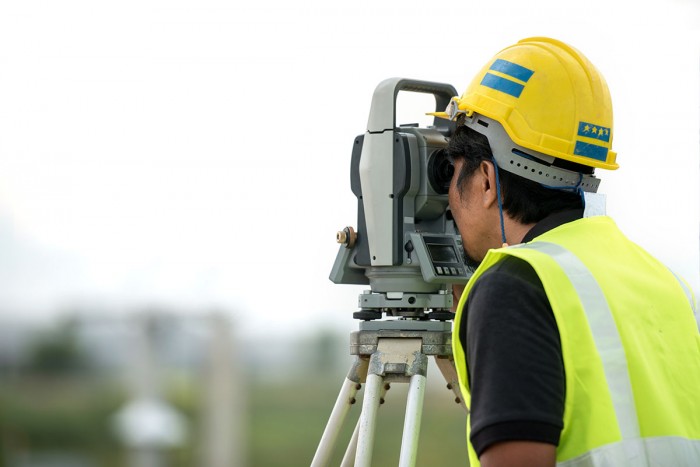Survey Technician
Kaihangarau Rūri Whenua
Alternative titles for this job
Survey technicians collect, record, and evaluate geographical information and prepare databases, maps, charts and plans.
Pay
New survey technicians usually earn
$49K-$55K per year
Experienced survey technicians usually earn
$60K-$80K per year
Source: Beca, Eighty4 Recruitment, Unitec, 2018.
Job opportunities
Pay
Pay for survey technicians varies depending on skills and experience.
- Survey technicians with up to two years' experience usually earn $49,000 to $55,000 a year.
- Survey technicians with more than two years' experience can earn between $60,000 and $80,000.
Sources: Beca, 2018; Eighty4 Recruitment, 2018; Unitec, 2018.
(This information is a guide only. Find out more about the sources of our pay information)
What you will do
Survey technicians may do some or all of the following:
- take measurements and plot out land divisions using survey equipment such as total stations (small, tripod-mounted digital telescopes that measure distances and horizontal and vertical angles)
- process data and make calculations gathered from fieldwork and surveys
- make observations, record measurements, and collect other data about the land
- draft and interpret plans for land use
- prepare reports using the measurements and data calculations
- supervise the work of survey assistants.
Skills and knowledge
Survey technicians need to have:
- knowledge of surveying methods
- the ability to interpret drawings, plans and maps
- knowledge of how to use new and current surveying technologies and equipment, such as total stations and drones
- skill using surveying and computer-aided design (CAD) software
- good mathematical knowledge, particularly in trigonometry
- an understanding of the laws and legislation relating to land use and surveying.
Working conditions
Survey technicians:
- usually work regular business hours
- work in offices, but also spend time doing technical work on-site at locations such as construction sites, farms, at sea, and populated areas
- may have to travel to remote on-site locations.
What's the job really like?

Blair Duckett
Survey Technician
How did you become a survey technician?
“I decided I wanted to get into surveying when I was 14. I saw a poster on the wall of my technical drawing class and was curious. Through school, I was able to gain work experience at a survey firm and enjoyed it.
“As I progressed through college I was intending to go to university but I wasn’t getting the marks required in some subjects. Instead I did a surveying course through my local polytechnic and entered the industry that way.”
What do you find most enjoyable and most challenging about being a survey technician?
“I enjoy overcoming challenges, especially in terms of mathematical solutions. In the early days of surveying I spent a lot of time in the field so there were good times out in the sun as well.
“One challenge of the job is interpreting rules and regulations and applying them, because there is room to interpret things in different ways and not all rules apply perfectly to every situation.”
What skills do you think are important for a survey technician?
“Communication is a big one. When you’re out in the field you have to make decisions on your own and communicate what you have done and why to your manager and also to your client. That’s especially important when things aren’t quite going as expected.”
Entry requirements
To become an assistant surveyor or survey technician you need to have a certificate or diploma in in surveying.
Secondary education
NCEA Level 3 is required to enter tertiary training. Useful subjects include geography, maths and English.
Personal requirements
Survey technicians need to be:
- methodical and accurate
- patient
- able to work well under pressure, as they often work to deadlines
- able to work independently as well as in a team.
Communication is a big one. When you’re out in the field on your own you need to communicate what’s happening to your manager and also to your client.

Blair Duckett
Survey Technician
Useful experience
Useful experience for survey technicians includes:
- work as a survey assistant
- draughting, engineering and cartography work
- tramping, orienteering and map reading experience
- experience in other outdoor pursuits.
Registration
Survey technicians can apply to become associate technical members of the New Zealand Institute of Surveyors.
Find out more about training
- New Zealand Institute of Surveyors (NZIS)
- (04) 471 1774 - nzis@surveyors.org.nz - www.surveyspatialnz.org
What are the chances of getting a job?
Shortage of survey technicians increases employment chances
Chances of getting a job as a survey technician are good as there is a shortage of workers. Reasons for this include:
- many survey technicians have left the industry or moved overseas
- an increase in the number of building and construction projects, such as KiwiBuild
- ongoing infrastructure projects.
As a result, the job of surveying or spatial science technician appears on Immigration New Zealand's construction and infrastructure skill shortage list. This means the Government is actively encouraging skilled survey technicians from overseas to work in New Zealand.
According to the Census, 408 survey technicians worked in New Zealand in 2018.
Demand for survey technicians highest in Auckland
Demand for survey technicians is highest in Auckland due to an increase in construction and infrastructure projects in response to the city's population growth.
Demand for survey technicians is steady in Christchurch, but the building and construction work following the 2010 and 2011 earthquakes is nearly complete.
Types of employers varied
Survey technicians typically work for:
- private surveying practices
- land developers
- local government
- mining companies
- construction or civil engineering consultancies.
Sources
- Buck, S, recruitment consultant, Eighty4 recruitment, careers.govt.nz interview, May 2018.
- Fraser, D, senior associate - surveying, Beca, careers.govt.nz interview, June 2018.
- Hill, T, senior surveyor, Birch Surveyors, careers.govt.nz interview, May 2018.
- Immigration New Zealand, 'Construction and Infrastructure Skill Shortage List', 27 May 2019, (www.immigration.govt.nz).
- Morrison, T, 'Residential Building Consents Rise to 13-Year-High', New Zealand Herald, 2 February 2018, (www.nzherald.co.nz).
- Poyner, D, academic leader - New Zealand Diploma in Surveying, Unitec Institute of Technology, careers.govt.nz interview, June 2018.
- Stats NZ, '2018 Census Data', 2019.
(This information is a guide only. Find out more about the sources of our job opportunities information)
Progression and specialisations
Survey technicians may progress to set up their own business by becoming a fully qualified surveyor, or move into management roles.
Survey technicians may specialise as a:
- Survey Photogrammetrist
- Photogrammetrists specialise in determining the size and scale of objects in photos.
- Aerial Survey Technician
- Aerial survey technicians specialise in creating reports and data from aerial photographs and the reference points that can be identified on them.
Last updated 25 March 2025


